- Home
- Michael McDowell
Jack and Susan in 1933 Page 6
Jack and Susan in 1933 Read online
Page 6
The road was frozen and hard beneath her feet, and she had stupidly not kicked her shoes out the window of the roadster, but onto the floor of the vehicle. Her shoes were wet and soggy now on the bed of the Hudson River, and did her no good at all.
Harmon was still convinced that he was on Fifty-second Street and kept calling for a taxi. He would have fallen on his face if Susan hadn’t kept a firm arm around his shoulder.
Her other arm was around the shoulder of Jack, who had only one slipper, and complained incessantly of the pain in his chest. “It’s like breathing knives. Cold steel. I feel like a sword swallower. I used to have a nightmare that I swallowed a razor blade. It felt just like this. Have you ever broken your ribs? Don’t.”
Susan had no idea that she was headed in the right direction on the narrow, lightless road. But she had chosen downhill, because going uphill, supporting two large men, would have been impossible.
“Can’t you shut up for a minute?” she asked Jack. “This is my honeymoon.”
“Taxi!” Harmon shouted.
“Do you have any idea where we’re going?” the husband of that dreadful woman Barbara wanted to know.
“I don’t know why I allowed myself to get into a car with you,” said Susan. “Considering what our last meeting was. You nearly killed me again. And I daresay that if you had figured out a way of sending me over the cliff without involving yourself, you would have availed yourself of it.”
“People with broken ribs don’t plot murder,” he returned. “Only suicide.”
“Taxi!” screamed Harmon, and lurched forward. He fell flat on his face. Susan let go of Jack and hurried to help her husband up. Harmon, with the prescience of the habitual drunkard, had dropped directly down on the overturned sign that pointed the way to the Quarry.
Harmon stood in front of the portico of the Quarry and stared up at the neo-Georgian mansion, as if wondering how he had gotten there without benefit of taxi. Susan banged on the door, rousing Audrey, who had come up from New York while Susan and Harmon were in Niagara Falls. The black woman seemed not a bit surprised to find Susan shivering shoeless, Harmon rolling drunk, and Mr. Beaumont complaining of the cold steel cutlery that he had ingested. With Audrey’s help, Susan got Jack into one of the bedrooms upstairs. He didn’t want to sleep; he wanted to take a hot bath, to melt those icy knives in his breast, and to wash out the muddy pebbles that had been ground into his calves and feet.
“Would you mind calling Barbara and telling her I’ve had a little accident?” he asked Susan. She replied that it would be a pleasure.
Susan remembered seeing a telephone in Harmon’s bedroom—it was hardly hers yet, as she hadn’t even slept there once. She wandered along opening doors but couldn’t seem to find it again. Presently, however, Harmon appeared, with Audrey pushing him from behind, and fell through one of the doors she hadn’t tried yet. While Audrey was pulling off Harmon’s clothes, Susan telephoned the Cliffs. Grace Grace answered, and Susan was giving her a message to relay to Barbara and Marcellus Rhinelander, when Barbara herself suddenly jumped into the conversation.
What happened?
“Very little,” said Susan, ignoring the rancor in Barbara’s voice. “Your husband drove Harm’s new car off a cliff.”
You weren’t in it?
“No,” returned Susan. “In fact, it was I who saved the lives of both Harmon and your husband.”
Much obliged, I’m sure.
“You’re quite welcome. But Mr. Beaumont asked me to let you know he’d be staying the night here, and would much appreciate being picked up here in the morning. He seems to be in considerable pain.”
I hope you don’t look at this as an opportunity to work your wiles on my husband. You may have sunk your poisoned talons into Harmon’s poor unresisting flesh, but I’d advise you to leave Jack quite alone. He has no intention of being unfaithful to me.
Susan stared at the receiver, as if not quite sure what she was hearing. She looked at Audrey, who was pulling off Harmon’s trousers. “Audrey,” Susan said, speaking distinctly and not too distantly from the telephone, “don’t bother putting those drugs into Mr. Beaumont’s drink. I won’t be seducing him tonight.” Then she spoke directly to Barbara again.
“Do join us for breakfast tomorrow, Barbara,” Susan said sweetly. “I miss you already.”
Then she rang off, and wondered if she should bother keeping Audrey from removing her husband’s undershorts. She didn’t, reflecting that Audrey wouldn’t be doing it now if she hadn’t done it many times before.
Susan helped Audrey pull a pair of pajamas onto Harmon, who with the dragging and the lifting and the twisting attendant on this procedure, woke up to the extent that he could call out for a taxi to bring him more brandy.
“There’s a taxi strike on, Harm,” Susan replied. “Go to sleep. Prohibition ends tomorrow.”
With that happy thought, Harmon turned over and snored loudly into a goose-down pillow with a large D embroidered on the lace hem.
“Miz Dodge?” said Audrey. “Something I can get you?”
A new life, thought Susan. “Nothing, Audrey. Thank you,” she said.
Audrey wandered back to bed.
Susan didn’t even know where Audrey’s bedroom was in this mansion. It had twenty-three rooms, a detached guesthouse, half a dozen outbuildings, two gazebos, a medium-size swimming pool with a diving tower, an English garden with roses, a French garden with yews, and an American forest garden with rhododendrons and lilacs. She’d been there for only a few hours that afternoon and had wandered about the place, thinking it cold, thinking it depressingly modern, thinking it—most oddly of all—hers.
There had been no covers on the furniture, which suggested that Harmon had visited the place frequently. Once a month, perhaps. Moving in a crowd where your social position was determined by the size of your hangover, Harmon was the first name in the register. So perhaps he had used the place as a cushioned room in which to recover from his heavy debauches. More likely, Susan thought, he had brought young women up here—young women who hadn’t required the trip to Niagara Falls before they’d crossed the threshold. That thought made her cringe with shame—not with the thought of how Harmon and the young ladies had passed their time at the Quarry. But at the thought that she, Susan, who had required the trip to Niagara Falls, was not more virtuous, but less virtuous than all those others. More conniving, more mercenary, more—
More everything that Barbara Beaumont thought she was.
A gold digger.
Susan lay in the steaming perfumed water in the bathroom that was decorated in gray and aqua, and massaged the soles of her feet. They were tender and cut in several places from the rocks in the unpaved road.
When she felt clean and warm again, she drained the bath and wrapped herself in a quilted silk kimono. She put on furred slippers and wandered through the hallways in the Quarry. Behind three doors she detected snoring—but she had no idea which was Harmon, which was Jack Beaumont, and which was Audrey.
She went down some stairs and pushed open a recalcitrant door. She found herself in a narrow unlighted hallway. She pushed open another sticking door and found herself in a kitchen. Behind a third, gleaming steel door she found a larder with refrigerator. She cut a slice of cheese and poured a glass of milk. She ate the cheese and drank the milk while standing at the corner of the great table in the middle of the kitchen, which was large enough and had the equipment to feed all the guests at the Waldorf-Astoria. When she was done she swept up the crumbs and washed the glass. She wandered out of the kitchen and found the living room. The modern furniture here was better suited for filling in a swamp than for accommodating the human anatomy. She wandered on and found a kind of library with a few books.
God’s Little Acre was one of them, and the other was something called The New Eugenics, and the plain brown wrapper it had come in was still wadded on the floor. The New Eugenics contained advice to married couples on delicate subjects. It had cost $
2.98 and had been ordered from the back of a periodical not known for the delicacy of its subject matter.
Susan pulled open the curtains over the French windows. Outside was a black garden. She saw a switch on the wall and flipped it experimentally.
The black garden was suddenly flooded with moonlight. It was a sedate, formal expanse of clipped yews, ivy-colored brick, and gravel paths.
This is a mistake, said Susan, opening the French doors and stepping out into the frigid winter night. She closed the door carefully behind her, and then, folding her arms for warmth across her breast, wandered along the symmetrical garden paths. The yews were clipped and black and solid and looked as if they’d been molded of something that was not twigs and leaves. An owl hooted from somewhere close, and it seemed a sound almost as artificial as the yews and the cold moonlight that flooded the regular gravel paths.
Seven hundred and fifty thousand men were out of work in New York City alone.
There was a civil war in Spain.
Banks had failed, and perfectly honest and hardworking people didn’t have enough to eat, and the winds blew hard and dry across the farms of the Midwest, and the red dust covered everything.
Those were the things that Susan should be thinking about. All those other unhappy people.
Except she shouldn’t be unhappy, should she? Walking in a moonlit garden behind her own mansion that overlooked the Hudson. On the contrary, she should be very happy. For Susan Bright Dodge there’d be no more Sunday-morning shampoos and home-done manicures. No more evenings spent mending runs in silk stockings and rips in shabby gloves. No more cheap little hats and scuffed shoes. No more dollar table d’hôtes in gritty little cafeterias in the west forties. No more leaning on a piano in her only decent dress, singing to the inebriated and the blasé. She’d be a socialite, and she’d live the life of the socialite. Shopping, luncheon, shopping, tea, shopping, cocktail party, dressing, dinner, fun. And then she’d go to bed and lie awake till dawn—about twenty minutes—where she’d think about the fact that she didn’t love her husband.
Harmon Dodge was charming, handsome, and rich. She was genuinely fond of him, and Susan was determined to pay for her keep. She’d poke Harmon into shape. She’d teach him responsibility. She’d make sure he didn’t get drunk every night. She’d be much more careful about his money than he was. She wouldn’t love him, but she’d act as if she did. If she had gotten security, comfort, freedom from fretfulness, then Harmon Dodge had gotten something that money only rarely buys—a good wife.
She went back inside, turned out the artificial moonlight, and went in search of the doors behind which she could hear snoring. She opened one and found Audrey in her curlers. She opened another and found her husband. She rolled him over, slipped off the kimono, and crawled in beside him. Harmon yelped when he felt her cold flesh against his, but he did not wake up. Susan did not go to sleep.
CHAPTER EIGHT
SHE AND HARMON remained about a week at the Quarry. The mansion was lonely and empty during the day. Harmon tended to sleep late. Breakfast and late afternoon tea were indistinguishable for him. Susan didn’t mind. She learned the layout of the house. She walked in the dead gardens, and protected herself better against the cold than on the first night spent at her new country home. She called a garage in Catskill and had the owner send over someone who could give her a few driving lessons. This turned out to be a fourteen-year-old girl whose eyes widened in lust when she saw the four expensive automobiles in the Quarry garages. Susan learned to make a slow circuit of the driveway, and once she even went so far as to the edge of the cliff where she, Harmon, and the idiot Jack had nearly plunged to their deaths. In the evenings, Susan and Harmon drove up to Albany, a place that—owing to the presence of the state legislature—sported as many speakeasies as Manhattan. Unsurprisingly, Harmon knew every one of them. Susan didn’t care to go to speakeasies, no matter how posh. She didn’t like to hear the crooners and the songbirds, no matter how splendid their voices or their repertoire. The congealed food, the poisoned liquor, the vile blue smoke, the spurious bonhomie of overweight politicians, and the grating laughter of their young female companions made Susan think of the lonely yew garden bathed in its unnatural moonlight as a place of some genuine charm. Sometimes, when she and Harmon returned to the Quarry as early as four or five in the morning, Susan walked there, and now thought of it as one of the nicer realities of her new life as the wife of Harmon Dodge.
On the night before their return to New York, Susan was glad she had learned to drive. For Harmon got so drunk at a place called the Café d’Esprit that Susan was afraid to ride with him. She drove, very slowly and very carefully, and they didn’t get home till seven in the morning, but they got there alive.
Now she’d been in New York City for more than a month, and was getting used to married life in this place. In New York, Harmon slept only till one in the afternoon. He was dressed by three, and usually by three-fifteen he’d found a taxi that would take him the two blocks to his offices. There at the office, he’d find out how much money Jack Beaumont had made for him and what sorts of bankrupted merchandise Jack Beaumont had snagged, and would sort through the periodicals and $2.98 books that came to the offices in plain paper wrappers. Then he’d wander off to a club, pour a number of measured draughts of junipered poison down his throat, telephone Susan, and tell her where to meet him for dinner. Invariably, Susan dressed, showed up at the restaurant without any particular hope of finding Harmon there, didn’t find him there, instituted a search for him by telephone, eventually found him, picked him up, brought him back to the designated restaurant, consumed a rather bad dinner, resorted afterward to one of the nightclubs she found increasingly depressing, was mumblingly introduced to half a dozen people Harmon called by the wrong names entirely, smiled and looked about, and listened to the singers and imagined what their dreary lives were like.
Just as invariably, Harmon was charming. Full of liveliness, full of compliments, and he seemed genuinely to love her. Not on the same scale as he loved alcohol, nightclubs, and the general tenor of his life—but more than just about anything else. Though there wasn’t, Susan had to admit, much more in Harmon’s life.
He had plenty of money—rather more than Susan expected, and that made her uneasy. She was a sensible, upright young woman, and it had seemed to her a lesser evil to have married for security than for wealth. Now she was the wife of a man who could be considered rich. He gave her a generous account at the bank, which in turn established accounts at the shops and salons on Fifth Avenue. She shopped and bought smart hats, and smart little suits, and highly polished endearing little shoes. Her old clothes she gave away. But when her wardrobe was filled, she stopped shopping. Harmon gave her a check to replenish her account, and when she informed him that it didn’t need replenishing, he looked surprised. “Well, clean out that old money, girl, and make room for some new,” he said. So Harmon’s girl bought an expensive new piano, and she bought out Schirmer’s catalogue of sheet music, and she hired her old nearsighted accompanist to come by every afternoon for a couple of hours so that she could sing. (She frightfully overpaid Mr. Moon, but this was a very real pleasure that Harmon’s money brought her. Mr. Moon had a Mrs. Moon and three young Misses Moon, named Miriam, Marjorie, and Marian, all of whom had a predisposition for regular food on the table.) Susan’s voice didn’t sound right at first, in a room that wasn’t filled with tobacco smoke and the fumes of alcohol, but she adjusted. No more tired and blasé faces turned wearily toward her anymore either, just Audrey, sagging over a little straight chair placed in the doorway, and George the elevator man, standing in the open doors of his machine when he wasn’t required on other floors.
Susan became a familiar face at the Doubleday bookstore on Fifth Avenue, and she read the books that everybody was reading : Mutiny on the Bounty, though she didn’t like the sea; Life Begins at Forty, even though she was only twenty-seven; Rip Tide, though a full novel in verse somehow made her nause
ated; Vicki Baum’s And Life Goes On, though sometimes it seemed it didn’t. She even read the advice on delicate matters in Harmon’s copy of The New Eugenics and discovered that she had already learned from Harmon more than the writer of this book ever knew on the subject.
She had her hair styled at a cost that would have supported her for a week three months ago. Her face was bathed in mud. Her arms were massaged with sliced vegetables. A girl with red hair who was supporting her legless father and three younger brothers made disparaging comments about her cuticles and painted her toenails a pale lavender. All but her head was locked in a box that was filled with steam that could have cooked a lobster.
She engaged a man to teach her to drive. He was twice as old as her first instructor, three times as expensive, and about half as knowledgeable. In her new violet Chevrolet Master DeLuxe Town Sedan—formerly the property of the owner of the largest bakery in Manhattan, sadly bankrupt—Susan drove along the quiet streets of Queens. She saw drawn-faced women on their stoops, men lounging on street corners wearier with inaction than they would have been after ten hours of hard labor, children who seemed either too thin or too fat. When she’d passed her driver’s test, she put her car in the garage and made no more journeys across the bridge to Queens.
She had met many of Harmon’s acquaintances, but none of their wives visited Susan. Harmon said, “You’re in luck, girl, so far as I can make out. I certainly would rather spend the day with Audrey, and George, and Mr. Moon than with that sort of gaggle. Enjoy it now, because it’s only a matter of time before they start trooping over here like Franco’s boys marching on the Bolshies.” Susan knew that no one visited the penthouse in the afternoons because she was perceived as a gold digger who had struck a mother lode in snagging Harmon Dodge. She also knew Harmon was right—it was only a matter of time before she was accepted in the society in which her husband moved. The women would tire of slighting the wife of such a charming man as Harmon, they’d find out somehow or other that she came from a good family and that her father had been a member of Theodore Roosevelt’s cabinet, and there would be some other upstart so loathsome Susan would look like royalty next to her. Susan made no efforts toward speeding up this inevitable acceptance, for like the trains in Italy, these things worked on their own schedule. She didn’t really care for the women of café society. They were similar to Barbara Beaumont, who was, in her way, a paradigm of the New York debutante. Barbara had come out in 1927 and she hadn’t been home since.

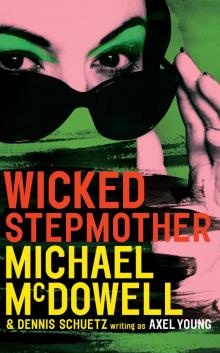 Wicked Stepmother
Wicked Stepmother Blackwater: The Complete Caskey Family Saga
Blackwater: The Complete Caskey Family Saga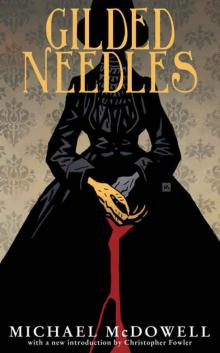 Gilded Needles (Valancourt 20th Century Classics)
Gilded Needles (Valancourt 20th Century Classics)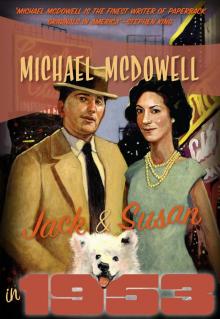 Jack and Susan in 1953
Jack and Susan in 1953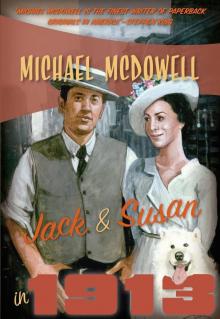 Jack and Susan in 1913
Jack and Susan in 1913 Rain
Rain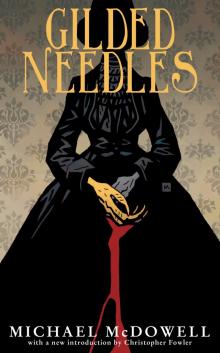 Gilded Needles
Gilded Needles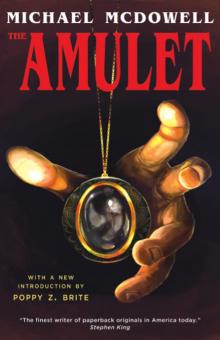 The Amulet
The Amulet Cold moon over Babylon
Cold moon over Babylon The Elementals
The Elementals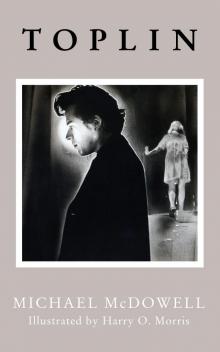 Toplin
Toplin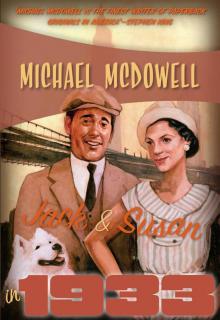 Jack and Susan in 1933
Jack and Susan in 1933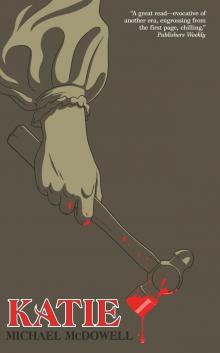 Katie
Katie The Valancourt Book of Horror Stories
The Valancourt Book of Horror Stories